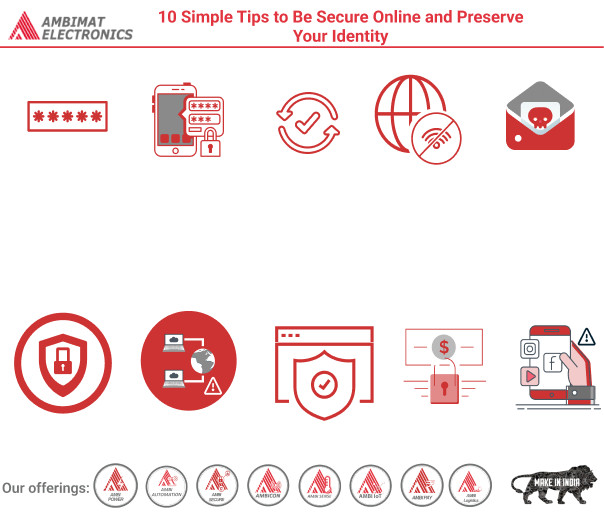Dear Readers,
We now use the internet on a daily basis, and although it has given us many conveniences, it has also exposed us to several threats. Take action to protect yourself online now more than ever with the increase in cybercrime and identity theft. These are some quick methods to protect your identity and be safe online.
-
Use secure passwords
Using strong passwords is one of the simplest and most efficient strategies to safeguard your online accounts. At least eight characters long, with a mix of letters, numbers, and symbols, constitute a secure password.
-
Make Two-Factor Authentication available.
By requesting that you input a code given to your phone or email in addition to your password, two-factor authentication adds an extra degree of protection to your online accounts.
-
Maintain Software Updates
Because software makers often offer updates that fix security vulnerabilities, it’s crucial to keep your programme up to date. Install updates as soon as they are made available, please.
-
Don’t use public WiFi
Public Wi-Fi networks are frequently unprotected and simple targets for hackers. Use your cellphone data or a protected Wi-Fi network instead of public Wi-Fi networks if at all feasible.
-
Avoid Email Phishing Scams at All Costs
Cybercriminals frequently use phishing schemes to get your personal information. Avoid clicking on links in emails from senders you don’t know, and be wary of emails that request personal information.
-
Build a virtual private network (VPN)
A VPN makes it more challenging for hackers to eavesdrop on your online activities by encrypting your internet traffic and hiding your IP address
-
Avoid Internet Information Sharing
Be careful when disclosing private information online, such your home address, phone number, or birthday. Never divulge private information when absolutely essential.
-
Antivirus software use
Malicious malware may be found and eliminated from your computer using antivirus software. Use antivirus software and make sure it’s up to date.
-
Use safe payment methods
Use safe payment options like PayPal or credit cards while purchasing online. Avoid utilizing bank transfers or debit cards since they offer less protection against fraud.
-
Take Caution While Sharing Information on Social Media
Social media may be exploited to steal your identity, so be careful what you post there. Don’t provide private details like your home address, phone number, or birthday.
By following these ten simple tips, you can be secure online and preserve your identity. Remember to stay vigilant and be cautious of potential risks, and always take steps to protect yourself online.
About Ambimat Electronics:
With design experience of close to 4 decades of excellence, world-class talent, and innovative breakthroughs, Ambimat Electronics is a single-stop solution enabler to Leading PSUs, private sector companies, and start-ups to deliver design capabilities and develop manufacturing capabilities in various industries and markets. AmbiIoT design services have helped develop Smartwatches, Smart homes, Medicals, Robotics, Retail, Pubs and brewery, Security.
Ambimat Electronics has come a long way to become one of India’s leading IoT(Internet of things) product designers and manufacturers today. We present below some of our solutions that can be implemented and parameterized according to specific business needs. AmbiPay, AmbiPower, AmbiCon, AmbiSecure, AmbiSense, AmbiAutomation.
To know more about us or what Ambimat does, we invite you to follow us on LinkedIn or visit our website.
References:-
https://us.norton.com/blog/how-to/how-to-recognize-and-protect-yourself-from-cybercrime


